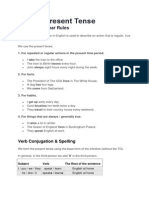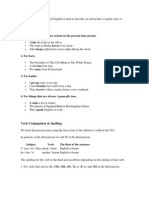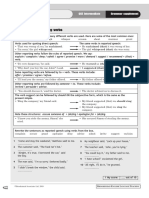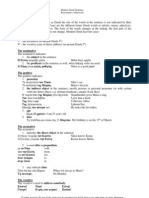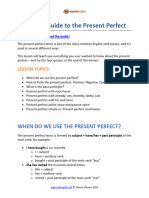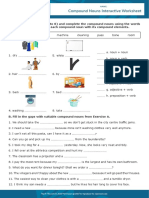Present Simple Tense in English Woodward English
Present Simple Tense in English Woodward English
Uploaded by
Gimena QuerciCopyright:
Available Formats
Present Simple Tense in English Woodward English
Present Simple Tense in English Woodward English
Uploaded by
Gimena QuerciCopyright
Available Formats
Share this document
Did you find this document useful?
Is this content inappropriate?
Copyright:
Available Formats
Present Simple Tense in English Woodward English
Present Simple Tense in English Woodward English
Uploaded by
Gimena QuerciCopyright:
Available Formats
U a
Present Simple Tense
in English
Present Simple Tense in …
Present Simple Tense in
English – Easy English Lesson
I speak English.
“I” is a subject. In general, a person.
“Speak” is a verb. In general, an action.
You can change the subject. For example:
You speak English
We speak English
They speak English
BUT, sometimes the verb changes. We say:
I speak …
You speak …
We speak …
They speak …
BUT, For He / She / It we use SPEAKS with an S at
the end.
The S is necessary at the end of a verb when the
subject is HE, SHE, or IT.
He speaks…
She speaks…
It speaks…
Look at these examples:
I speak Spanish.
You speak Portuguese.
But…
He speaks Italian.
The S is necessary at the end of the verb.
You cannot say:
He speak Italian …. (No, this is NOT correct)
We need an S at the end of the verb. We say:
He speaks Italian. (This is correct)
Another example:
She speaks four languages.
English is a language, Spanish is a language,
Portuguese is a language, Italian is a language.
She speaks four languages.
Again, the S is necessary at the end of speak.
Let’s look at another verb. We say:
I live …
You live …
We live …
They live …
BUT, for He / She / It we use LIVES with an S at
the end.
The S is necessary at the end of a verb when the
subject is HE, SHE, or IT.
He lives …
She lives …
It lives …
Look at these examples:
I live in a small apartment.
He lives in a big house.
LIVES with an S at the end because HE lives.
Now look at this sentence:
Mary lives in Paris.
Why do we use LIVES?
Because Mary is SHE.
SHE lives in Paris.
One more example:
We live in … New Zealand.
ENGLISH
GRAMMAR PRESENTSIMPLETENSE Woodward ENGLISH
+Affirmative
SUBJECT VERB
/you/we/they+ speak
he/she/it + speaks
Thirdpersonverbsneedthefinal"s"inaffirmativesentences.
IspeakSpanish. HespeaksItalian.
YouspeakPortuguese. ShespeaksFrench.
VERB
@WoodwardEducation
SUBJECT
1/you/we/they+ live
he/she/it + lives
Thirdpersonverbsneedthefinal"s"inaffirmativesentences.
liveinanapartment. MarylivesinParis.
Helivesinabighouse. 2WeliveinItaly.
www.grammar.cl www.woodwardenglish.com www.vocabulary.c.
Sometimes the verb changes a little for HE, SHE
and IT (third person).
Look at this verb: HAVE
We say:
I have …
You have …
We have …
They have …
BUT, for He / She / It we use HAS.
We do NOT say Haves… because the verb is
irregular.
Look at these examples:
I have a good idea.
You have black hair.
She has a dictionary.
John has blue eyes.
We will learn more about these types of third
person changes in another lesson.
Negative Sentences – Present
Simple Tense
Look at this sentence:
They speak English.
This is an a"rmative sentence.
How can I make this a NEGATIVE sentence?
In English, we use don’t and doesn’t to make a
negative sentence in present simple tense.*
They speak English. … becomes …
They don’t speak English.
Don’t shows that the sentence is negative.
We don’t say:
They no speak English. (No, this is NOT correct)
We say:
They don’t speak English. (Yes, this is CORRECT)
Note: We use don’t and doesn’t to make a
negative sentence in the present simple tense.
* Exceptions: Negative sentences that use To Be or
Modal Verbs (can, might, must, etc.)
What is the di!erence between DON’T and
DOESN’T?
Look at this chart:
When the subject is I, YOU, WE or THEY … we use
don’t before the verb.
When the subject is HE, SHE or IT … we use
doesn’t before the verb.
DON’T is a contraction of DO NOT.
DOESN’T is a contraction of DOES NOT.
After don’t and doesn’t we have a VERB.
This verb is the base form of the infinitive.
The infinitive is the original form of the verb
before it is conjugated or changed.
The infinitive is to go, to need, to speak, to live.
But we want the BASE form of the infinitive… this
is without the TO at the beginning.
Instead of TO GO, only GO.
instead of TO NEED, only NEED.
Instead of TO SPEAK, only SPEAK.
Instead of TO LIVE, only LIVE.
Let’s look at the example of the verb SPEAK. We
say:
I don’t speak …
You don’t speak …
We don’t speak …
They don’t speak …
For example, the a"rmative:
I speak Spanish.
What is the negative form?
The negative is:
I don’t speak Spanish.
Another example: The a"rmative:
We speak Italian.
What is the negative form?
The negative is:
We don’t speak Italian.
BUT, look at this a"rmative sentence:
He speaks Spanish.
What is the negative form of this sentence?
He doesn’t speak Spanish.
There is NO S at the end of ‘speak’ in the negative
sentence. Why?
We use the base form of the infinitive. The
infinitive is TO SPEAK, we just want the base form,
which is SPEAK.
Third person verbs lose the final S in negative
sentences.
I don’t speak …
He doesn’t speak …
The verb in negative form will always be SPEAK
without an S.
Let’s look at another example:
She speaks Italian.
What is the negative form of this sentence?
She doesn’t speak Italian.
Again, there is NO S at the end of ‘speak’ in the
negative sentence.
Let’s look at another verb: NEED.
The a"rmative sentence is:
I need help.
What is the negative form of this sentence?
I don’t need help.
And this a"rmative sentence:
He needs help.
We need the S at the end for the third person in
a"rmative sentences.
What is the negative form of this sentence?
He doesn’t need help.
Again, no S at the end of the verb because it is a
negative sentence.
Let’s look at another verb: LIKE.
The a"rmative sentence is:
I like football.
What is the negative form of this sentence?
I don’t like football.
And this a"rmative sentence:
He likes football.
We need the S at the end for the third person in
a"rmative sentences.
What is the negative form of this sentence?
He doesn’t like football.
Again, no S at the end of the verb because it is a
negative sentence.
Questions – Present Simple
Tense
Look at this sentence.
You speak English.
This is an a"rmative sentence. What is the
question?
DO you speak English?
In English, we use DO and DOES to make
questions in present simple tense.*
* Exceptions: Questions that have To Be or Modal
Verbs (can, might, must, etc.)
You speak English. (A"rmative sentence)
Do you speak English? (Question)
The word DO at the beginning tells us it is a
question.
Look at the chart:
Do is used for questions with I, you, we, and they.
Does is used for questions with he, she, and it.
Also the same rules apply to the verb in questions.
We use the base form of the infinitive.
For example, the a"rmative sentence:
He speaks German.
There is an S at the end of speaks because the
subject is HE and it is an a"rmative sentence.
What is the question?
Does he speak German?
No S at the end of speak because we need to base
form of the infinitive.
Another example:
You live in Spain.
This is an a"rmative sentence.
How can we change this to a question?
Do you live in Spain?
The DO tells us it is a question.
Another a"rmative sentence:
He lives in Mexico.
Notice the S at the end of lives because the subject
is HE and it is an a"rmative sentence.
How can we change this to a question?
Does he live in Mexico?
No S at the end of live because we need to base
form of the infinitive.
Present Simple Tense –
Summary Chart
I hope you found this English lesson about the
Present Simple Tense useful.
If you did, please let other people know about this
lesson.
5.2k Shares
Lesson tags: A!rmative sentences, Do, Does, Doesn't, Don't,
Present Tense
← Sunrise vs. Sunset Day + Part of the Day →
Back to: English Course > Present Simple Tense
Follow Us
1Mil
Followers
217k
Followers
127k
Followers
English Course
Collapse
Present Simple Tense
Present Simple Tense in English
Day + Part of the Day
ON + Day + Part of the Day
Don't and Doesn't in English - Simple
Present Tense - Negative Sentences
Like - likes - don't like - doesn't like
Like + Verb-ING - Like + Infinitive -
Enjoy + Verb-ING
Daily Routines in English
How to say an email address in
English
Free Time Activities in English
Sports in English
I agree - I don't agree
© 2003-2024 Woodward Education - All Rights
Reserved Worldwide.
Terms and Conditions - Privacy Policy
You might also like
- English Grammar Guide: 23 Grammar Rules You Must Know To Speak and Write English Like A NativeFrom EverandEnglish Grammar Guide: 23 Grammar Rules You Must Know To Speak and Write English Like A NativeRating: 3.5 out of 5 stars3.5/5 (32)
- Do Does Did DoneDocument6 pagesDo Does Did Doneyiyi tan50% (2)
- Work On Your Grammar PDFDocument128 pagesWork On Your Grammar PDFganimedes89798100% (1)
- Simple Present Tense: English Grammar RulesDocument20 pagesSimple Present Tense: English Grammar RulesVidia darmayanthiNo ratings yet
- Auxiliaries Do-Does-DidDocument5 pagesAuxiliaries Do-Does-DidValentina GUERRERO MARMOLEJONo ratings yet
- The Everything French Verb Book: A Handy Reference For Mastering Verb ConjugationFrom EverandThe Everything French Verb Book: A Handy Reference For Mastering Verb ConjugationRating: 5 out of 5 stars5/5 (1)
- Module About Root Words Prefixes COMPOUND WORDSDocument12 pagesModule About Root Words Prefixes COMPOUND WORDSphenoren33% (3)
- Simple Present Tense and Past TenseDocument23 pagesSimple Present Tense and Past TenseLisa Aulia100% (1)
- English 4 VCDocument32 pagesEnglish 4 VCJavier CastelblancoNo ratings yet
- Present Simple Tense in English - Grammar LessonDocument7 pagesPresent Simple Tense in English - Grammar LessonVerónica PilcoNo ratings yet
- English 4 VCDocument33 pagesEnglish 4 VCcarolina Leon CastroNo ratings yet
- ENGLISH 4 GuideDocument30 pagesENGLISH 4 GuidewilliamNo ratings yet
- Do Does Did Done - English GrammarDocument1 pageDo Does Did Done - English Grammarvargas199511No ratings yet
- Present Simple YEnglishtubeDocument5 pagesPresent Simple YEnglishtubeA SNo ratings yet
- KP English HomeDocument14 pagesKP English Homepy27hlNo ratings yet
- Dont Give UpDocument10 pagesDont Give UpyiswilNo ratings yet
- Silmple Present Tents: Verb Conjugation & SpellingDocument4 pagesSilmple Present Tents: Verb Conjugation & SpellingIta Masyita IskandarNo ratings yet
- Simple Present TenseDocument9 pagesSimple Present TenseWahyu Budi SulistiawanNo ratings yet
- French 1st LessonDocument6 pagesFrench 1st Lessonalicia.berard.sNo ratings yet
- 1 Lectura de InglesDocument9 pages1 Lectura de InglesLiisdey JiimenezNo ratings yet
- 3B - 074 - Septi Dimas Jamaludin - 3 - MODULEDocument11 pages3B - 074 - Septi Dimas Jamaludin - 3 - MODULEGanryuNo ratings yet
- TENSE Consolidation Simp. Pres. Vs Pres. Cont.Document21 pagesTENSE Consolidation Simp. Pres. Vs Pres. Cont.tatianypertelNo ratings yet
- The Simple Present TenseDocument19 pagesThe Simple Present TenseJavier Gustavo Chuco ChucoNo ratings yet
- Present Simple YEnglishtube PDFDocument5 pagesPresent Simple YEnglishtube PDFمحمد قاسمNo ratings yet
- 3 ModuleDocument11 pages3 ModuleIndah safitriNo ratings yet
- 1.INTERMEDIATE PLUS - PEDAGOGICAL GRAMMAR - Simple PresentDocument5 pages1.INTERMEDIATE PLUS - PEDAGOGICAL GRAMMAR - Simple PresentAntonio MonteiroNo ratings yet
- Simple Present Tense: English Grammar RulesDocument6 pagesSimple Present Tense: English Grammar RulesZahrotul JannahNo ratings yet
- Present Simple TheoryDocument5 pagesPresent Simple TheorySimona MariaNo ratings yet
- Clase 4-Gimenez-Verb To Be - Simple PresentDocument12 pagesClase 4-Gimenez-Verb To Be - Simple PresentPabloNo ratings yet
- Present Simple: GramáticaDocument6 pagesPresent Simple: GramáticaRicardoMerchanFalcatoNo ratings yet
- English Grammar RulesDocument105 pagesEnglish Grammar RulesAnonymous vRpzQ2BLNo ratings yet
- Ingles Basico 1Document19 pagesIngles Basico 1dulceNo ratings yet
- Simple Present TenseDocument6 pagesSimple Present TenseMuhammadiyah KotaProbNo ratings yet
- French ER Verbs and Conjugations E BookDocument29 pagesFrench ER Verbs and Conjugations E BookfatemaNo ratings yet
- The Simple Present TensesDocument3 pagesThe Simple Present TensesrharshaohmNo ratings yet
- Gerund, Infinitive, ParticipleDocument6 pagesGerund, Infinitive, Participleriya madaan100% (1)
- Tugas Bahasa Inggris "Rangkuman Dan Contoh": Disusun Oleh Nama: Candrika Della Vabelia Jurusan: 1 B KeperawatanDocument6 pagesTugas Bahasa Inggris "Rangkuman Dan Contoh": Disusun Oleh Nama: Candrika Della Vabelia Jurusan: 1 B KeperawatanJamilah p3No ratings yet
- Verbs TensesDocument32 pagesVerbs TensesLucas Padrão100% (1)
- Curso de Ingles WoodwardDocument321 pagesCurso de Ingles WoodwardIsai Garcia Flores100% (1)
- English Grammar 1: Learning Materials For The Course English LanguageDocument45 pagesEnglish Grammar 1: Learning Materials For The Course English LanguagepankajskecNo ratings yet
- Everything About "Do"Document9 pagesEverything About "Do"Amy ZuraidaNo ratings yet
- Present Simple Vs Present ContinuousDocument8 pagesPresent Simple Vs Present Continuousmzt messNo ratings yet
- Trabalho de InglesDocument9 pagesTrabalho de InglesPalmerim NapoleaoNo ratings yet
- Dosier AlvaroDocument22 pagesDosier AlvaroFernando Muñoz MontesinosNo ratings yet
- The Simple Present Tense in English Is Used To Describe An Action That Is RegularDocument5 pagesThe Simple Present Tense in English Is Used To Describe An Action That Is RegularMarcos Augusto RomanNo ratings yet
- Ud1 Comunicacion Prof InglesDocument23 pagesUd1 Comunicacion Prof InglesAnonymous 3D8vtRNo ratings yet
- The Verb To DoDocument15 pagesThe Verb To DoSantiago Francisco Zamora100% (1)
- LESSON 2 Verbs To Do To HaveDocument7 pagesLESSON 2 Verbs To Do To HaveGallego Paula ANo ratings yet
- Name: Ahmed Ameer Shaker Department: Mechanical Engineering Stage: First - Evening Group: - BDocument8 pagesName: Ahmed Ameer Shaker Department: Mechanical Engineering Stage: First - Evening Group: - Bson gokuNo ratings yet
- 000 - Unidad 1 - InglésDocument31 pages000 - Unidad 1 - InglésAnonymous 3D8vtRNo ratings yet
- Simple Past: USE 1 Completed Action in The PastDocument7 pagesSimple Past: USE 1 Completed Action in The PastYsa YesoNo ratings yet
- Draft Collaborative GR 33Document21 pagesDraft Collaborative GR 33jenniferNo ratings yet
- Amity International School Class-X Subject-French Common Errors in French in Class XDocument4 pagesAmity International School Class-X Subject-French Common Errors in French in Class Xvartika.guptaNo ratings yet
- Simple Present Tense: English Grammar RulesDocument6 pagesSimple Present Tense: English Grammar Rulesrosmaniza ismailNo ratings yet
- WRITING 1 Simple PresentDocument5 pagesWRITING 1 Simple PresentSyaiful RullyNo ratings yet
- Simple Present Tense Uses and RulesDocument6 pagesSimple Present Tense Uses and RulesMaurizio Iparraguirre GarcíaNo ratings yet
- InglesDocument8 pagesInglesjuanNo ratings yet
- The Simple Present Tense and Frequency AdverbsDocument5 pagesThe Simple Present Tense and Frequency AdverbsBrayan Ramirez0% (1)
- Verb Tense Tutorial: Complete List of Simple Present FormsDocument43 pagesVerb Tense Tutorial: Complete List of Simple Present FormsRoxana TudoseNo ratings yet
- English Page - Simple PastDocument6 pagesEnglish Page - Simple PastidahashimNo ratings yet
- Semana5 1 PDFDocument4 pagesSemana5 1 PDFgerson chero custodioNo ratings yet
- English Everyday: Higher-Level Ability and Understanding. Level 1. the VerbsFrom EverandEnglish Everyday: Higher-Level Ability and Understanding. Level 1. the VerbsRating: 5 out of 5 stars5/5 (1)
- Completing SentenceDocument6 pagesCompleting SentenceausrafutanjuNo ratings yet
- Words That Are True Linking VerbsDocument6 pagesWords That Are True Linking VerbsMaria Alejandra Suarez Useche100% (1)
- SEMESTER 2 2013/2014 Bil3063 Syntax and Morphology At06 Bachelor of Education (Teaching English As A Second Language) With HonourDocument15 pagesSEMESTER 2 2013/2014 Bil3063 Syntax and Morphology At06 Bachelor of Education (Teaching English As A Second Language) With HonourAin SuzianieNo ratings yet
- Kinds of Sentences WorksheetDocument2 pagesKinds of Sentences WorksheetChintan ShahNo ratings yet
- 2 Latihan Soal Countable Dan Uncountable NounsDocument2 pages2 Latihan Soal Countable Dan Uncountable NounsPutri Amelia100% (1)
- Preparação de Aula W8Document20 pagesPreparação de Aula W8Leiz de FariaNo ratings yet
- Language: Reporting Verbs: Unit 13Document4 pagesLanguage: Reporting Verbs: Unit 13Consuelo Pinilla PeñarrubiaNo ratings yet
- DLL - Gr.1 Q3 - Sentences and Non-SentencesDocument4 pagesDLL - Gr.1 Q3 - Sentences and Non-SentencesLovely Faye Dayata100% (3)
- Irregular Verbs Test 2Document1 pageIrregular Verbs Test 2Katia LeliakhNo ratings yet
- Jade Flower Palace Translation AnalysisDocument6 pagesJade Flower Palace Translation AnalysisRoma FloresNo ratings yet
- 1 Learn Spanish E-BookDocument109 pages1 Learn Spanish E-BookLoredana Matran100% (1)
- Prepositional PhraseDocument12 pagesPrepositional PhraseNurli GirsangNo ratings yet
- Changing From Adjectives To NounsDocument1 pageChanging From Adjectives To NounsNeenaNo ratings yet
- Indirect SpeechDocument36 pagesIndirect SpeechPiyush ChaudharyNo ratings yet
- English 6 - AdjectivesDocument47 pagesEnglish 6 - AdjectivesKit LigueNo ratings yet
- Grammar in Context - Sandra Elbaum - 289-292Document4 pagesGrammar in Context - Sandra Elbaum - 289-292Rizki RamadhanNo ratings yet
- Modalverbs2Document5 pagesModalverbs2edgar fernando chaves gutierrezNo ratings yet
- UJAux Verbs R3Document186 pagesUJAux Verbs R3Hatice Yıldırım67% (3)
- English Quarter 2 Module 3 - Personal PronounsDocument31 pagesEnglish Quarter 2 Module 3 - Personal PronounsSir RSNo ratings yet
- Cases Modern Greek GrammarDocument1 pageCases Modern Greek GrammarLadyDenali100% (1)
- Linking WordsDocument3 pagesLinking WordsAndrea RodriguezNo ratings yet
- Free PDF Present PerfectDocument19 pagesFree PDF Present Perfectmarcosraimundo2010No ratings yet
- Grammar Level A1Document3 pagesGrammar Level A1Lucia CighirNo ratings yet
- Compound Nouns Interactive WorksheetDocument2 pagesCompound Nouns Interactive WorksheetManuel VivasNo ratings yet
- Conditional SentenceDocument3 pagesConditional SentenceLiwanto LeeNo ratings yet
- EF 3.0 - B2 - 07B - SB P. 145 (Grammar Bank Verbs of Senses)Document1 pageEF 3.0 - B2 - 07B - SB P. 145 (Grammar Bank Verbs of Senses)Robert SkylineNo ratings yet
- MCQ Modals - PDFDocument21 pagesMCQ Modals - PDFRavi VermaNo ratings yet
- Planificare U.I. Going For Gold Upper-Interm.Document16 pagesPlanificare U.I. Going For Gold Upper-Interm.Ioana IuraNo ratings yet

















